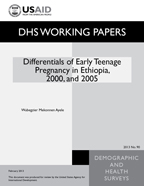
Abstract:
This study measured the levels and
characteristics of early teenage pregnancy
(that is, pregnancy before age 17) among
women age 17-24 in Ethiopia, based on
analysis of the Ethiopia Demographic and
Health Surveys (EDHS) conducted in 2000 and
2005. The 2005 EDHS showed that, despite a
minimum legal marriage of 18 years in
Ethiopia, early marriage remains
common, with a median age at first marriage
among women age 25-49 of 16.1 years. Almost
all pregnancies in Ethiopia occur within
marriage, and the median age at first birth
is about 17 years. Levels of contraceptive
use are low, at 15% among married women of
reproductive age.
The study measured the percentage of early
teenage pregnancy by background
characteristics of women age 17-24 in 2000
and 2005. The association of
different background characteristics with
early teenage pregnancy in 2000 and 2005 was
ascertained using odds ratios with their
confidence intervals in logistic regression
analysis.
Despite efforts to curb early marriage in
Ethiopia and improve adolescent reproductive
health services, early teenage pregnancy
among young women age 17-24 increased between
2000 and 2005. The analysis found a
statistically significant increase in early
teenage pregnancy between the two survey
years among women who were uneducated, in
minority Christianity
denominations, belonging to minority ethnic
groups, and members of households in the poor
and rich wealth terciles. In both surveys,
the odds of early teenage pregnancy were
significantly lower among women age 17-24
with more education.
To address the problem of early teenage
pregnancy, stronger measures should be taken
to implement of the official minimum age at
first marriage, and more effort should be
exerted to change the cultural tradition of
early marriage, which is a root cause of the
problem. In addition to increasing girls’
enrollment in secondary schools, the
government of Ethiopia should scale up adult
education programs for out-of-school young
women, with more emphasis on reproductive
health issues in the curriculum.
 Differentials of Early Teenage Pregnancy in Ethiopia, 2000, and 2005 (PDF, 508K)
Differentials of Early Teenage Pregnancy in Ethiopia, 2000, and 2005 (PDF, 508K)
